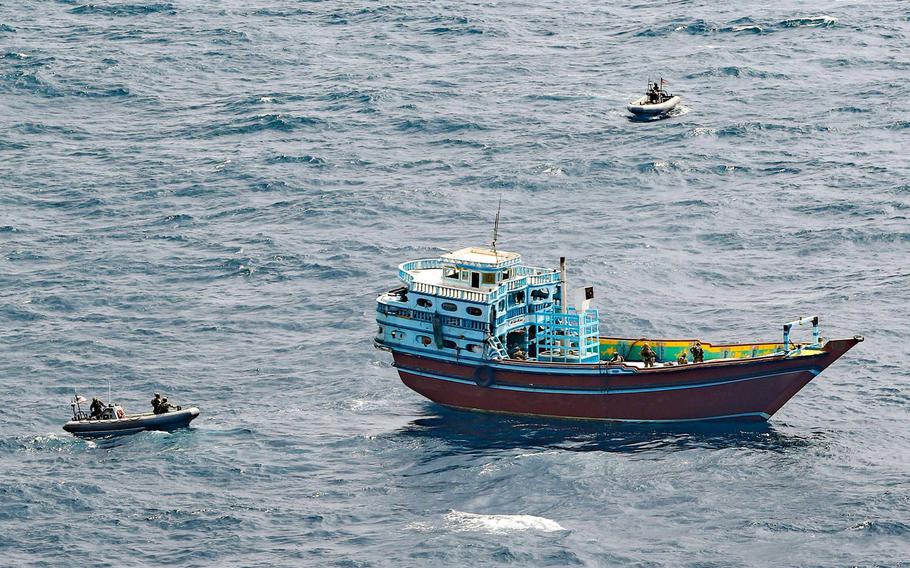
Service members from the destroyer USS Winston S. Churchill board a stateless dhow off the coast of Somalia and interdict an illicit shipment of weapons and weapon components, Feb. 12, 2021. (Louis Thompson Staats IV/U.S. Navy)
The Navy SEALs lost at sea after a ship-boarding operation went awry near Somalia last week were dispatched to look for suspected Iranian weapons bound for militants in Yemen, which has become a staging ground for repeated attacks on commercial vessels in the Red Sea, two U.S. officials familiar with the incident said Sunday.
The two service members who went missing were preparing to board the ship in rough seas when one of them slipped from a ladder. The second sailor, seeing their comrade fall into the water, dove in to help, the officials said on the condition of anonymity to describe early assessments. The incident occurred Thursday in the Gulf of Aden.
It was not immediately clear whether other military personnel successfully boarded the ship or, if so, whether any Iranian-made weapons were located.
Search-and-rescue operations are ongoing in the gulf’s warm waters, where powerful swells and exhaustion are more of a concern than hypothermia as commanders hold out hope the two SEALs will be found alive, officials said. The missing personnel have not been publicly identified.
National Security Council spokesman John Kirby, asked about the operation during an appearance Sunday on the CBS News program “Face the Nation,” characterized it as part of the U.S. military’s ongoing work to disrupt Iran’s shipment of weapons to Yemen, where the Houthis, a militant group supported by Tehran, function as the de facto government in parts of the country. He sought to draw a distinction between that activity and the U.S.-led airstrikes targeting Houthi facilities there that same day, saying the two are “not related.”
Still, Thursday’s mishap underscores the persistent challenge facing the Biden administration and its international partners who have vowed to hold the Houthis and Iran accountable for a steep rise in attacks that have greatly disrupted commercial shipping in the Red Sea. Senior U.S. officials have blamed Tehran for having “aided and abetted” the crisis, saying the Houthis would be incapable of threatening the shipping route if not for Tehran’s technological and intelligence support.
The Houthis have said their actions are in protest of Israel’s military campaign in Gaza.
Thursday’s airstrikes in Yemen targeted numerous radar stations, missile launch sites and storage facilities used to stage the Red Sea attacks, but the Pentagon has said the group is likely to remain a threat. The Biden administration has not ruled out future military action there but has sought to tread carefully, fearful that an overreaction could engulf the Middle East in violence.
U.S. forces routinely partner with other nations’ militaries to blunt piracy and weapons smuggling in the region.
Interdicting suspicious or adversarial vessels, known as visit, board, search and seizure, or VBSS, are some of the most difficult and dangerous missions undertaken by highly trained troops. Such operations typically include approaching the suspect vessel in smaller boats and using ladders and climbing tools to get aboard, which can be complicated by violent waves and hostile crew members.
American Special Operations forces deployed in the region have faced other challenging missions. In November, five members of an elite aviation unit were killed during a air-refueling accident off the coast of Cyprus.